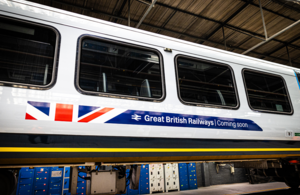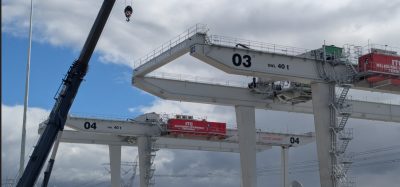Landmark railways bill to create Great British Railways and improve passenger services nationwide
Posted: 7 November 2025 | Gabriel Higgins | No comments yet
The UK government introduces the Railways Bill, establishing Great British Railways to simplify ticketing, improve reliability, strengthen passenger rights and modernise rail services across Britain.


Credit: Department for Transport
Landmark legislation that will transform Britain’s railways was introduced on 5 November 2025, paving the way for a simpler, more reliable network that prioritises passengers over profits.
The Railways Bill, to be laid before Parliament tomorrow, will establish Great British Railways (GBR), a new publicly owned company combining the management of passenger services and rail infrastructure. GBR will be accountable to passengers, freight customers and taxpayers, focusing on delivering lasting improvements across the network. Responsible for coordinating everything from track and train to cost and revenue, GBR aims to create a more unified railway that offers easier journeys and better value for money.
Headquartered in Derby, GBR will introduce a one-stop-shop app where passengers can check train times and book tickets. The bill also establishes a strengthened passenger watchdog, a powerful new voice to investigate poor service and advocate for improvements.
Join our free webinar: Rail cyber-security in a time of technological and regulatory transformation
Join our expert panel, including speakers from Nokia and Siemens Mobility, to explore the critical convergence of cybersecurity and 5G rail comms.
Date: 3 Dec | Time: 15:00 GMT
Can’t attend live? No worries – register to receive the recording post-event.
Transport Secretary Heidi Alexander said: “Britain deserves a railway that is fit for the future – one that rebuilds the trust of its passengers, regenerates its communities and restores reliability and value for money. The introduction of this legislation is a major step towards a rail network that supports Britain’s businesses and delivers for the travelling public – paving the way for economic growth and access to opportunity across the country.”
Passengers currently navigate a complex system of over 17 organisations, resulting in complicated fares, delayed upgrades, disjointed timetables and no single authority in charge. The Railways Bill builds on the government’s public ownership programme, which has already improved services. Southeastern and LNER are among the top five operators nationally for lowest cancellation rates. South Western Railway has more than tripled the number of new trains in service since entering public ownership, offering more comfortable journeys. Passengers can now use tickets across publicly owned operators during cancellations at no extra cost.
Key elements of the Railways Bill include:
A strengthened passenger watchdog
The watchdog will act as passengers’ champion, ensuring a more inclusive railway for all. It will have powers to investigate poor service, demand improvements and provide a clear, accessible process for complaints.
Fare and ticketing reform
GBR will modernise fares and ticketing, allowing passengers to purchase tickets through a single website and app, replacing 14 existing platforms. Tickets will remain available at station offices, vending machines and onboard trains. Pay As You Go and other trial schemes will be expanded to make travel simpler and more flexible.
Better business planning
GBR will have a duty to grow rail freight, providing freight operators with long-term strategic planning, capacity allocation, and timetabling processes. This stability will boost confidence in the railway supply chain and support sector growth.
Localised decision making
The bill gives devolved governments and England’s mayors greater input in local railway management, improving connectivity and ensuring decisions reflect regional needs.
In addition, the government will publish an accessibility roadmap, providing immediate actions to improve services for disabled passengers. The plan includes expanding eligibility for the Disabled Persons Railcard, wider rollout of ‘welcome points’ across stations, more consistent staff training, and improvements to lifts and escalators to enhance confidence in travel.
Andy Burnham, Mayor of Greater Manchester, said: “The introduction of the Railways Bill to Parliament marks a pivotal moment for rail reform across the country. This is a once-in-a-generation opportunity to make trains more reliable and tickets easier to use, with clearer accountability for passengers and greater confidence in every journey. In Greater Manchester, we are already working with the government and the rail industry to connect trains, buses, trams and cycling routes as part of the Bee Network. We will continue to ensure Mayors and city regions have a statutory role in shaping local rail services, unlocking rail as an engine of growth across the country.”
Ken Skates, Cabinet Secretary for Transport and North Wales, said: “I very much welcome the introduction of the UK Railways Bill, which will improve rail services and deliver a more integrated, accountable and passenger-focused railway across the UK. It is a significant step forward in our collaborative approach to rail reform, and I am confident that our continued joint working with the UK government will ensure the delivery of a modern, integrated railway that works for passengers in Wales and throughout the United Kingdom.”
Ben Plowden, Chief Executive of Campaign for Better Transport, added: “An accessible, affordable and reliable rail network integrated with the wider transport system is key to delivering sustainable economic growth and improving regional productivity. Today marks another important step on the road to realising this vision and delivering a railway that works for passengers, freight operators and the country as a whole. We look forward to working with the government, MPs and the rail industry over the coming months to ensure this bill provides the right foundation for a reformed railway.”
Jane Gratton, Deputy Director of Public Policy at the British Chambers of Commerce, said: “Businesses welcome plans for a more joined-up rail system, giving regions a stronger voice in shaping services. An efficient rail network is crucial to unlock opportunities for investment, jobs and growth across the country. Great British Rail must deliver the certainty and connectivity that businesses are desperate for, with the needs of passengers and freight customers central to future decision making.”
The Railways Bill represents a once-in-a-generation overhaul of Britain’s railways, aiming to simplify the network, strengthen passenger rights, improve accessibility, and create a system that works efficiently for passengers, businesses and freight operators alike.
Stay Connected with Global Railway Review — Subscribe for Free!
Get exclusive access to the latest rail industry insights from Global Railway Review — all tailored to your interests.
✅ Expert-Led Webinars – Gain insights from global industry leaders
✅ Weekly News & Reports – Rail project updates, thought leadership, and exclusive interviews
✅ Partner Innovations – Discover cutting-edge rail technologies
✅ Print/Digital Magazine – Enjoy two in-depth issues per year, packed with expert content
Choose the updates that matter most to you. Sign up now to stay informed, inspired, and connected — all for free!
Thank you for being part of our community. Let’s keep shaping the future of rail together!
Related topics
Infrastructure Developments, Passenger Experience/Satisfaction, Rail Fares/Ticket Pricing, Reform, Regulation & Legislation, Rolling Stock Orders/Developments, Smart/Contactless Ticketing, The Workforce, Timetabling/Scheduling
Related organisations
British Chambers of Commerce, Campaign for Better Transport, Great British Railways, UK Government
Related regions
Related people
Andy Burnham, Ben Plowden, Heidi Alexander, Jane Gratton, Ken Skates








